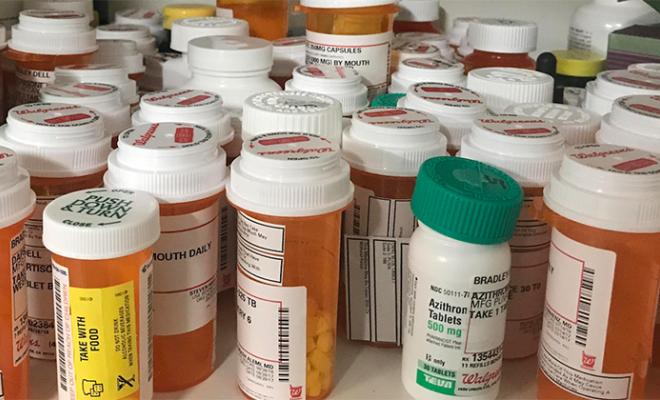Thanks to advancements in care and research, cystic fibrosis is slow-burning when we aren't experiencing crises like sepsis or in end-stage disease. Due to the slowing disease progression, I once viewed the occasional loss of a few lung function percentage points as inconsequential. I didn't see the big picture until I entered end-stage CF -- those lost points add up.
In high school, I argued that my doctor treated my infections too aggressively with IV antibiotics: “I only lost 2 percent of my forced expiratory volume in 1 second (FEV1) this month!” My doctor responded by printing a line graph showing my lung function in freefall over two years. “Oh. I never viewed my lung function that way before.” Suddenly, I didn't think through the lens of what I'd lost over the month, but what I'd lost over the past two years -- over 20 percent FEV1. From that day on, I took more seriously the treatments, diet, and exercise I'd neglected.
It's funny what a simple graphic of the “big picture” can do to one's mindset.
However, not all doctors think like mine. Actually, she's one of only two doctors in the legions I've met who showed me the big picture. Many doctors underestimate health data's value to patients, assuming it's useful only for researchers and specialists. The Cystic Fibrosis Foundation doesn't think along those lines, nor should you.
For more than 50 years, the Foundation has collected voluntary Patient Registry Data from CF Foundation-accredited care centers in the United States, and they make much of it available for the patient population to review. These data reveal trends that influence improvements in personal, center-wide, and nationwide CF care.
Using my Patient Summary Report, I can review graphs similar to what my doctor once showed me to analyze the downward or upward crawls of my weight and lung function. I can also check how often I've been hospitalized and on what days. The personalized report even displays the dates of my last positive bacterial cultures.
Knowing my detailed patient history empowers me to assess my past for patterns that could inspire a new path of treatment.
You can get all of this data, too, by asking members of your CF care team for your Patient Summary Report.
The Patient Registry Data also fuels a feature that allows patients to compare vital statistics between CF care centers. You can use this information to start a discussion between you and your care team to inform which care center is right for you. Many variables can raise or drag a center's statistics, but if you're moving to a new region with more than one CF center, comparing hospital statistics could give you confidence in your care selection.
My favorite product of the registry data is the 2017 Patient Registry Annual Data Report of nationwide CF statistics. You may think the document is nothing more than an interesting (or even boring) overview of the CF community, but I've found personal hopes and worries while reviewing the data, and as a result, I've rethought my care strategies.
Here are just a few ideas for how to use the Annual Data Report to influence your care and lifestyle:
Know which bugs to avoid: Pages 31-36 reveal which bacteria are common in the CF population, and the data even split into age groups on page 32. Using this information, we see that nontuberculous mycobacteria are spreading in our community. Have your doctors discussed how to avoid NTM? Ask them, because there are precautions you can take.
Know your mutation class risks: Did you know your mutation class puts you more or less at risk of certain symptoms? For example, I have Class II mutations. People with this class of mutations are more likely to have liver disease and CF-related diabetes (p. 66) than people whose mutations are in Classes IV-VI. This knowledge makes me prioritize taking precautions like drinking extra water and less alcohol, and getting regular blood sugar checks.
Know you're not alone: The mental health statistics on p. 63 are staggering: Above the age of 18, 20.6 percent of us report anxiety disorder and 26.8 percent of us report depression. Many people don't seek mental health diagnoses because they feel such problems alienate them. But, this data makes clear that many in our community have the same struggles -- I do, too. Please, find help if you need to.
Know there's hope: It's the rocket fuel for our fight. Look at our progress and derive hope from it: The number of people with CF who have Pseudomonas aeruginosa has steeply decreased (p. 31). More people are getting lung transplants and living longer with them (pgs. 73-74). Our median survival rate rose from 31 years old in 1993 to nearly 44 in 2017 (p. 6). The beauty of numbers is that they don't lie: We're getting much better at tackling this disease.
Ask questions: Bring the data into your next clinic visit. Ask your CF care team how they use the Registry data to decide what treatments to recommend or changes to a nutrition or fitness plan that may be worth trying.
Read the 2017 Patient Data Registry report to see what calls out to you. Empower yourself.
Having difficulty interpreting the data? Check out this helpful resource. Don't want to read the report? There's a graphic-heavy data highlights handout.
Join the conversation on Facebook.





